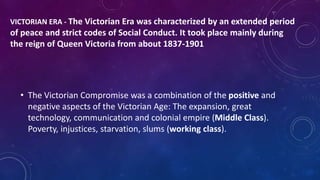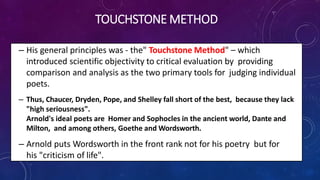The Victorian Era (1837-1901), marked by social codes and contrast between progress and poverty, saw Matthew Arnold emerge as a significant literary critic, stressing the importance of objective criticism separate from personal biases. Arnold advocated for poetry as a critical interpretation of life, expressing that it holds essential truths necessary for understanding existence, while arguing that high seriousness and the grand style are crucial for poetic excellence. He introduced the 'touchstone method' for literary evaluation and critiqued historical and personal biases in judgment, positioning himself as a pivotal figure in the evolution of English literary criticism.

![MATTHEW ARNOLD
1822-1888
“The critical power is of lower rank than
the creative. . . . It is undeniable that the
exercise of a creative power, that a free
creative activity, is the highest function
of man . . . . The critical power . . . see[s]
the object as in itself it really is. . . .”
The Function of Criticism 1385-6](https://image.slidesharecdn.com/arnoldandhiscriticismbyijs-190819170502/85/Arnold-and-his-criticism-2-320.jpg)

![Matthew Arnold is the first critic who produced
scientific conception of reading.
• Arnold initiated the formal criticism in poetry!
• Mathew Arnold, the most influential of the Victorian critic has been
characterized by David Daiches as “the great modern critic”.
• Arnold deplored [found unacceptable] the lack of firm authority and
centrality of excellence in the literature of their age and within their
criticism each has sought to establish critical standards which would be
valid independent of time and space.](https://image.slidesharecdn.com/arnoldandhiscriticismbyijs-190819170502/85/Arnold-and-his-criticism-4-320.jpg)






















